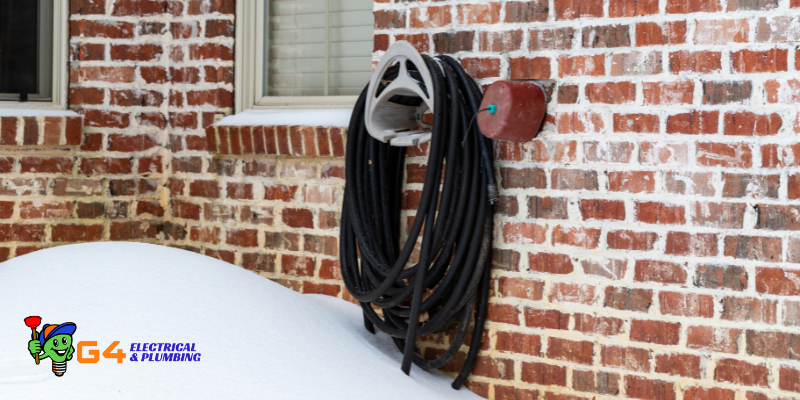Winter Plumbing Preparation – Mabank, TX
When Texas winters roll around, even a mild drop in temperature can spell trouble for unprotected plumbing. Preparing your plumbing for colder weather is crucial, especially for homeowners who might not typically expect severe winter conditions. Here’s a straightforward guide on how to protect your pipes, prevent costly repairs, and ensure your home’s plumbing system remains intact during a Texas winter.
1. Insulate Your Pipes, Especially in Unheated Areas
One of the most effective ways to prevent freezing pipes is to add insulation. Pipes in unheated areas—like garages, attics, and crawl spaces—are at the highest risk during cold spells.
- Tip: Use foam pipe insulation, which you can find at most hardware stores, to wrap pipes in vulnerable areas. This insulation keeps pipes warm enough to avoid freezing, even if temperatures drop unexpectedly.
- Advanced Protection: Consider using heat tape on pipes in especially exposed areas. Heat tape can provide added warmth to prevent freezing, though it’s essential to follow manufacturer instructions carefully for safety.
2. Disconnect and Drain Outdoor Hoses
Leaving hoses attached during winter is a common oversight that can lead to significant plumbing problems. When water left in hoses freezes, it can create pressure that damages indoor plumbing.
- Tip: Disconnect and drain all outdoor hoses before the first freeze. It’s a simple step but highly effective in preventing bursts.
- Consider Adding Covers: For added protection, consider insulating outdoor faucets with covers. These covers help keep outdoor plumbing warm, preventing unexpected freezing.
3. Keep a Consistent Indoor Temperature
During colder months, keeping a consistent indoor temperature helps protect pipes from sudden drops that could lead to freezing.
- Tip: Avoid lowering your thermostat below 55°F, even if you’re away from home. For maximum efficiency, keep cabinet doors open under sinks in kitchens and bathrooms to allow warm air to circulate around the pipes.
- Why This Matters: A consistent indoor temperature minimizes the risk of a sudden freeze and reduces the likelihood of pipes bursting, especially in rooms along exterior walls.
4. Know Where Your Main Water Shut-Off Valve Is Located
In the event of a freeze or burst pipe, being able to quickly shut off your water can help minimize damage. Every homeowner should know where the main water shut-off valve is located and how to operate it.
- Tip: Locate your main shut-off valve and make sure everyone in your household knows where it is, too. In Texas homes, the valve is often in the basement, garage, or outside near the foundation.
- Emergency Preparedness: Practice turning off the valve so that, in an emergency, you can react quickly to stop water flow and prevent extensive flooding.
5. Let Faucets Drip on Cold Nights
Letting faucets drip on extremely cold nights can help prevent pipes from freezing. Moving water is less likely to freeze, so this simple step can help keep your pipes safe.
- Tip: Let faucets drip slightly in areas most susceptible to freezing, such as bathrooms located along exterior walls or kitchens in poorly insulated areas.
- Additional Benefit: This small drip can also reduce pressure build-up in pipes, further protecting against bursting.
6. Schedule a Plumbing Inspection Before Winter
A professional inspection is one of the best ways to ensure your plumbing is prepared for Texas winters. An experienced plumber can identify vulnerabilities in your system that you might not notice.
- G4 Electrical & Plumbing offers a yearly maintenance plan that includes plumbing inspections designed to spot potential issues early. Our technicians check everything from pipe insulation to faucet integrity to ensure your system is winter-ready.
7. What to Do If Your Pipes Freeze
If you suspect a frozen pipe, it’s crucial to act fast to prevent it from bursting.
- Tip: Turn on faucets connected to the frozen pipe to relieve pressure. Then, try warming the pipe with a hairdryer, heating pad, or warm towels. Avoid open flames or high-heat devices that could damage pipes.
- When to Call a Professional: If you cannot thaw the pipe or suspect a burst, contact a professional plumber. A burst pipe can cause significant damage, so it’s best handled by an expert.
Stay Safe and Avoid Winter Plumbing Issues
Winter in Texas may not be as extreme as in northern states, but cold snaps and unexpected freezes still happen. By taking these preventative steps, you can protect your plumbing from freezing temperatures and avoid the high cost of emergency repairs. Need help getting your plumbing winter-ready? Contact G4 Electrical & Plumbing today at (903) 802-2655 or visit our website at www.g4electrical.com to schedule an inspection.
Let’s keep your home safe and comfortable all winter long!



